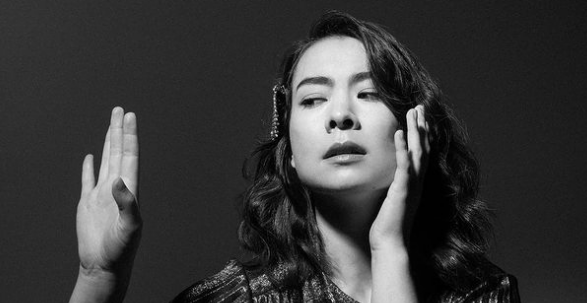If you’re a fan of indie, you may have heard that singer-songwriter Mitski recently released “Laurel Hell,” her first major release after she announced her hiatus in 2019. “Laurel Hell” mixes haunting ballads and 80s-inspired pop to create a story about Mitski’s struggles with her identity, her anxieties, and the pressures of her career.
The first track on “Laurel Hell'' is “Valentine, Texas,” a short song that sets the tone for the rest of the album. It opens with the lines, “Let’s step carefully into the dark/Once we’re in, I’ll remember my way around.” This is the first time “the dark” is referenced— a motif that is repeated throughout the album.
It then transitions into “Working for the Knife,” the first single released from “Laurel Hell.” The song begins with a monotonous, dull beat, mirroring the exhaustion emanated by the lyrics. In it, Mitski discusses how she exploits her own pain for the entertainment of others, causing her to feel beaten down by the music industry, yet she cannot stop. The song carries a somber, uneasy sound, the percussion and synth almost reminiscent of machinery, while her singing carries a tired, muted tone.
The next track, “Stay Soft,” details Mitski’s struggle with vulnerability and intimacy. In stark contrast from the last two tracks, this song is the first on the album to utilize an upbeat, 80s-style pop sound. This song also references “the dark,” with Mitski telling the subject that she’s going to take them where the dark remembers them. Similarly, the next song, “Everyone,” is the song that perhaps drives in the theme of “the dark” the most. Unlike “Stay Soft,” however, “Everyone” is solemn and regretful. Here, Mitski sings of opening her arms to “the dark,” but she “didn’t know she was young” and “didn’t know what it would take.” This could reference her initial naivete toward the music industry. She was eager to throw herself into the unknown, yet didn’t realize how stressful it would be. The song closes with “Sometimes I think I am free/Until I find I’m back in line again.” This could be referencing her hiatus and her desire to escape the public eye, yet when she tries to leave, she finds herself wanting to return.
The next few tracks, “Heat Lightning,” “The Only Heartbreaker,” and “Love Me More,” were all released as singles following “Working for the Knife.” Each of them deal with Mitski’s relationships and anxieties, once again including the 80s pop sound that shows itself multiple times throughout the album. “Heat Lightning” is a slow, dreamlike song in which she feels the weight of her worries approaching, but can do nothing to stop it, instead surrendering to it. “The Only Heartbreaker” and “Love Me More” are more upbeat, but deal with similar subject matters. In “The Only Heartbreaker,” Mitski laments that she cannot compare to her partner, as she repeatedly makes mistakes while her partner is seemingly perfect. In “Love Me More,” Mitski, feeling restless and hollow, longs to be a new person. She craves validation from her partner, begging to be loved in order to suppress the negativity she feels about herself and her dissatisfaction with her life.
After “Love Me More” comes “There’s Nothing Left for You,” a slow, melancholy song that begins quiet, then suddenly crescendos into a passionate plea. Here, Mitski accepts that her partner has moved on and encourages them to leave, as she feels she isn’t good enough for them. In this song, she pours emotion into her voice and her lyrics, making it one of the more heart wrenching tracks on the album. After that is “Should’ve Been Me,” a return to the peppy sound a few songs prior, although the subject matter is anything but upbeat. Now, after Mitski has encouraged her significant other to leave, she recognizes how similar their new partner is to her. Once again feeling isolated and alone, she acknowledges that she was emotionally unavailable, but regrets that her former partner is no longer pursuing her.
Finally, the album closes out with “I Guess” and “Our Lamp.” “I Guess” is a haunting track about the singer finding herself after tying her identity to a relationship. The last track is “Our Lamp,” another peppy song in which she has the realization that her partner no longer wants to be with her. The final words, “That’s where you loved me,” echo, repeat, and fade out until the track finally ends.
Mitski’s “Laurel Hell” is an exceptional comeback, highlighting her lyrical skill and bringing a compelling addition to her discography. By playing with different sounds, imagery, and genres, she has created a unique lineup of songs that emphasize her skill. Mitski’s ability as a songwriter and singer truly shines through in “Laurel Hell.”

















